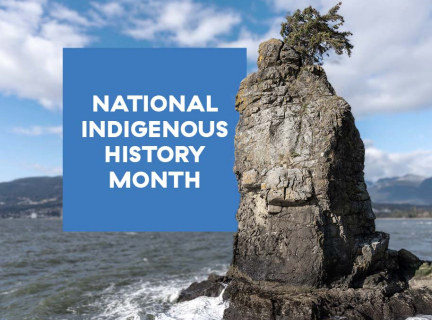National Indigenous History Month

Every June, National Indigenous History Month honours and celebrates the rich history, heritage, resilience and accomplishments of First Nations, Inuit and Métis peoples across Canada.
This nationwide observance recognizes the strength and diversity of Indigenous communities and provides an opportunity to learn about Indigenous people’s lives, cultures, and their ways of knowing, being, and doing.
Join the celebration by learning more about Indigenous people’s history, lives and cultures, reading books and watching films by Indigenous authors and filmmakers, attending events and exploring some of the resources below.
Explore local Indigenous cultures, language and territories
Learn more about the xʷməθkʷəy̓əm (Musqueam), Sḵwx̱wú7mesh (Squamish), and səlilwətaɬ (Tsleil-Waututh) Nations:
Interactive Maps
Explore Indigenous history, territories, languages, arts, place names and community landmarks:
- First Peoples’ Map of B.C.
Discover more about Indigenous cultural heritage, arts, place names, community landmarks, and all 36 languages Indigenous to what is now known as British Columbia. - Sḵwx̱wú7mesh – Squamish Atlas
An interactive map of the territory, with pronunciation. Produced through Kwi Awt Stelmexw, a Sḵwx̱wú7mesh language and culture organization. - xʷməθkʷəy̓əm – Musqueam Place Names Map
An interactive tool where you can hear recordings of the hən̓q̓əmin̓əm̓ language from Musqueam Elders past and present, view historical photographs, explore children’s place names stories and more.
Indigenous Language Learning Resources
- First Voices
An online space for Indigenous communities to share and promote language, oral culture, and linguistic history. Language teams work with elders to curate and upload audio recordings, dictionaries, songs and stories. The website also includes language learning lessons, Indigenous language keyboard apps, language reclamation data and more. - The Assembly of First Nations Language Guide
Discover how the Assembly of First Nations is supporting the survival and growth of First Nations languages. - xʷməθkʷəy̓əm – Musqueam hən̓q̓əmin̓əm̓ Language Orthography, Alphabet & Pronunciation
Learn about the hən̓q̓əmin̓əm̓ language orthography, alphabet, pronunciation and more. - kʷikʷəƛ̓əm – Kwikwetlem First Nations hən̓q̓əmin̓əm̓ Language Guide
Guidelines and sound bites to help you use the correct spelling and pronunciation for some commonly used hən̓q̓əmin̓əm̓ names and words.
UNDRIP in Vancouver
The United Nations adopted the Declaration on the Rights of Indigenous Peoples (UNDRIP) in 2007 to establish a universal framework of minimum standards for protecting the rights of Indigenous peoples of the world. UNDRIP expands on existing human rights to address the specific needs of Indigenous peoples, including self-determination and free, prior, and informed consent.
Canada endorsed UNDRIP in 2016 and passed related national legislation in 2021. British Columbia passed its own UNDRIP Act in 2019.
In 2021, Vancouver City Council created a joint UNDRIP Task Force with the xʷməθkʷəy̓əm (Musqueam Indian Band), Sḵwx̱wú7mesh (Squamish) and səlilwətaɬ (Tsleil-Waututh) Nations in an effort to continue to shape foundational Nation-to-Nation relationships, engage the diverse Indigenous populations living in Vancouver, and develop recommendations for implementing UNDRIP.
This intergovernmental process produced Vancouver's UNDRIP Strategy, which was endorsed by all three Nations as a framework for Indigenous relations and reconciliation.
In 2023, the UNDRIP Task Force reconvened as the UNDRIP MSTV Intergovernmental Table. Comprised of elected representatives from all four governments, the Table refined 79 recommendations into specific shared actions and initiatives that support, uphold, and recognize Indigenous rights. The Table is currently working with staff from all four governments to jointly develop a 5-year Action Plan. This plan will be presented to each Nation's government and City Council for endorsement in 2024.
As a provincially-legislated and publicly-funded institution, Vancouver Public Library does not have a direct role in implementing UNDRIP. However, the library supports UNDRIP implementation through its core functions of education, information-sharing, and cultural programming.
The library is committed to advancing reconciliation by elevating Indigenous voices, aligning with Truth and Reconciliation’s Calls to Action, and working closely with xʷməθkʷəy̓əm (Musqueam), Sḵwx̱wú7mesh (Squamish) and səlilwətaɬ (Tsleil-Waututh) Nations on developing the Indigenous Collection and finding ways to engage and work with Urban Indigenous peoples in Vancouver.
Key efforts include strengthening Indigenous collections at every branch, sharing Indigenous culture widely, and collaborating with Indigenous groups on collection development. Through these efforts, the library aims to fulfill its commitments to UNDRIP Articles 15 and 21 as well as the City of Vancouver's UNDRIP Strategy and the library's own Indigenous Rights and Reconciliation Strategy.
Read, Watch and Listen
Indigenous Collections at your local branch
Indigenous Films:
- DVDs & Blu-rays
- Indigenous Film Collection
- Indigenous Cinema at the NFB
- Kanopy Streaming
(Note: To view films about Indigenous Peoples, search “Indigenous.” Refine your search results by choosing from Suggested Matches or using Filters.)
Indigenous Storytellers in Residence programs:
Recommended Reading - National Indigenous History Month
Upcoming Events
-
Have you ever wondered about the Indigenous artwork around Vancouver? Do you want to know whose land the City of Vancouver is on? Join us for a newcomer-friendly introduction to Indigenous matters in Vancouver. We will cover land acknowledgements, Truth...
2:00pm – 3:30pm
Online Event -
Have you ever wondered where to start learning about Indigenous considerations in Vancouver? Join us for an introduction to land acknowledgements, Truth and Reconciliation, common terminology, recent changes like UNDRIP, art and architecture, and a few things you should know...
2:00pm – 3:30pm
Online Event
